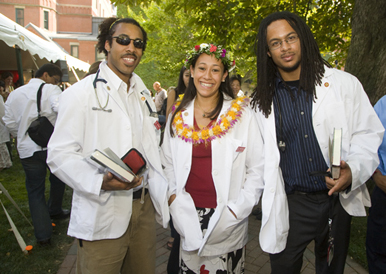A Change of Clothing Marks a Changed Life

Tiffany Hunter remembers talking about cancer with her biology teacher when she was a high school student on Long Island. “I couldn’t understand why there wasn’t a cure yet,” says Hunter (MED’11).
On Friday, September 7, Hunter, who has since gone on to do breast cancer research, including a master’s thesis on the effects of an anticancer agent derived from soy, joined 155 other first-year medical students for the Boston University School of Medicine’s white coat ceremony, at which incoming students are “cloaked” in their first white coat to mark the beginning of their medical careers. The tradition of a white coat ceremony for new medical students began in 1993 at Columbia University’s medical school, and quickly spread to many other universities. Boston University’s first ceremony took place in 1994.
As they processed to their seats under a large white tent set up on the Medical Campus’ Talbot Green, BU’s newest medical students didn’t have to look far for inspiration. Just outside the tent, doctors, nurses, and more senior medical students crisscrossed the brick paths in the warm sun, carrying clipboards, pagers clipped to their belts, stethoscopes protruding out of the hip pockets of their own white coats.
“This is a remarkable moment,” Phyllis Carr, MED associate dean for student affairs, told the Class of 2011. “You now take your first steps in the grand adventure of a career in medicine.” Carr was followed by MED’s associate dean of admissions, Robert Witzburg (MED’77), who noted that this year’s entering class of medical students was “the most diverse group in our school’s history,” hailing from more than half of America’s states and 26 countries. Just over half the incoming students, who range in age from 20 to 40, are female, and about 23 percent are underrepresented minorities.
After the statistics were given, Karen Antman, dean of MED and Medical Campus provost, addressed the students. Antman said that both the white coat and the Hippocratic oath, the traditional physician’s creed that the students would take later in the ceremony, were about the professionalism and ethics now expected of them.
“The message today is not that you’re preparing for a career in medicine,” she said. “It is that you are already embarked on it.”
Antman then introduced guest speaker John Howe III (MED’69), president and CEO of Project HOPE (Health Opportunities for People Everywhere), an international medical aid and training organization. Howe told the Class of 2011 that they had now entered the “world of medicine,” a world “in which you can make a huge difference.” He urged the students to volunteer in the community and take internships overseas to “put a face on America’s humanity.”
After Howe spoke, it was time for the students to come up on stage and don their white coats. When the ceremony ended, Hunter stood with her parents, smiling broadly and posing for pictures. She looked down at her new white coat, still creased from its package. “I do feel different,” she said. “I feel like it’s official.”
Chris Berdik can be reached at cberdik@bu.edu.